Fluoride: Is It Safe for My Baby and Do Babies Need Fluoride?
- Why fluoride is added to the community water supply and how it impacts tooth decay rates
- Whether your baby needs supplemental fluoride or should be using fluoridated toothpaste
- Why people on the internet distrust fluoride…and what the data shows about its safety
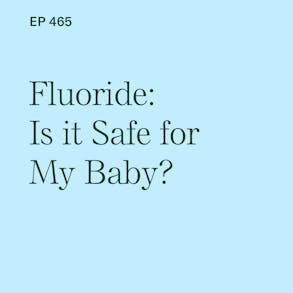
LISTEN TO THIS EPISODE
Episode Description
Fluoride is a naturally occurring mineral compound that can contribute to the prevention of tooth decay. But does your baby need supplemental fluoride, or fluoridated toothpaste…and why do people on the internet distrust fluoride in the water supply? Listen to learn about fluoride and is it safe for your baby?

Links from this Episode
- Baby-Led Weaning with Katie Ferraro program with the 100 First Foods™ Daily Meal Plan, join here: https://babyledweaning.co/program
- Baby-Led Weaning for Beginners free online workshop with 100 First Foods™ list to all attendees, register here: https://babyledweaning.co/baby-led-weaning-for-beginners
Other Episodes Related to this Topic

Latest Episodes

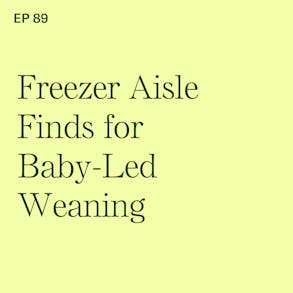
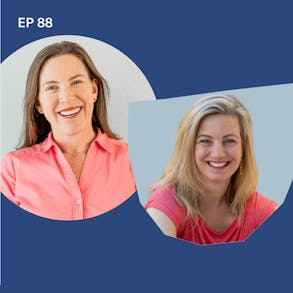
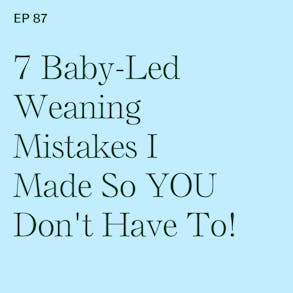
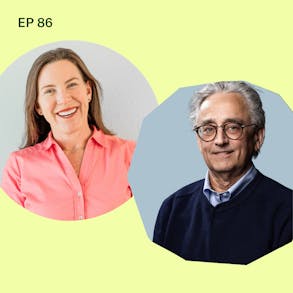

Factor (0s):
My kids are back in school and I am loving being back into the swing of having a routine. I try to cram as much work in from the second they leave for school till the minute they get home. And factors, no prep, no mess meals, make my workday lunch routine. A breeze Factor has a full menu of chef crafted meals with options like calorie Smart Protein plus and keto factors fresh. Never frozen meals are dietitian approved, and they're ready in just two minutes. So no matter how busy you are, you'll always have time to enjoy nutritious, great, tasty meals. Treat yourself to restaurant quality meals that feature premium ingredients like filet mignon, shrimp, and blackened salmon. As someone who spends their whole workday making and testing recipes and menus and meal plans for babies, I have to say that I love all of the delicious adult options from Factor. Head to factor meals.com/weaning50 and use the code weaning50 to get 50% off your first box plus 20% off your next month. That's code weaning50 at factor meals.com/weaning50. That's five zero to get 50% off your first box plus 20% off your next month while your subscription is active.
Katie Ferraro (1m 12s):
If you are a type A super planner like me, you love getting organized about what solid foods your baby's going to eat. I have a free feeding guide for you. You're gonna love this one. It's called the Baby-Led Weaning Pantry Planning Guide. It's a 10 page checklist divided by categories of foods, many of which you probably already have on hand. Plus, there's tips in there on how to modify those foods so they're safe for your baby. You can download the Baby-Led Weaning Pantry Planner for free. If you go to my website, babyledweaning.co/resources. Again, that's babyledweaning.co/resources. Click on the Pantry Planner and it's free. And if you think about the public health effort to fluoridate the community water supply in a widespread effort to reduce tooth decay, it's kind of reminiscent of how we have a widespread public health initiative to fortify the grain supply with folic acid, right?
Katie Ferraro (1m 52s):
Because folic acid deficiency in pregnancy, especially early pregnancy, can lead to neural tube defects. So in order to prevent that across the board, the folic acid goes into the grain supply, and it's done a great job in reducing neural tube defects. Same thing with fluoridation of community water supplies in the effort to reduce widespread tooth decay. Hey there, I'm Katie Ferraro, registered dietitian, college nutrition professor and mom of seven specializing in Baby-Led Weaning. Here on the Baby-Led Weaning with Katie Ferraro podcast. I help you strip out all of the noise and nonsense about feeding, giving you the confidence and knowledge you need to give your baby a safe start to solid foods using Baby-Led Weaning.
Katie Ferraro (2m 44s):
Hi, and welcome back. Today we're talking about Fluoride, which is a mineral that people on the internet freak out about, but it's actually really important for your baby and their to be developing teeth if they don't have any teeth yet. And today I wanna talk a little bit bit about Fluoride, whether it's safe for your baby, and does your baby need Fluoride? Now, I like to start out each of these solo training episodes with a Baby-Led Weaning tip of the day. And today's tip is the vast majority of babies in the United States at least, do not require any supplemental or extra fluoridation. We're gonna talk about some stats today, but the Centers for Disease Control report that about 73% of the United States population receives fluoridated water.
Katie Ferraro (3m 29s):
So if you do the math, there's only about 27% of the population living in areas without access to fluoridated water. And within that 27%, there's only a very small subset of children, specifically those who are deemed at being at high risk for dental caries by a healthcare provider would be recommended. Fluoride supplements and dental caries are dental cavities. We'll talk a little bit about that. But the bottom line is, if you live in an area with fluoridated water, you don't need to stress about supplemental or extra Fluoride to give your baby. So it's literally one less thing you need to worry about. But hang tight, because I'm gonna share exactly where babies get Fluoride from as well as what it does. And then why are people so scared of Fluoride on the internet?
Katie Ferraro (4m 12s):
Today, we're going to look at what Fluoride is. We're going to talk about how prolific its use is, how effective is it? What are the recommendations like what is the American Dental Association, American Academy of Pediatrics say about Fluoride for your baby? What's the deal with fluoridated toothpaste? How about Fluoride supplements? What happens if a baby gets too much Fluoride? And then why do people think Fluoride is dangerous? So let's go ahead and get started with what Fluoride is. So Fluoride is a naturally occurring mineral compound that can contribute to the prevention and the reduction of dental caries, which are cavities. So Fluoride plays a role in your baby's oral and their tooth health. So your baby does not need teeth to start solid foods.
Katie Ferraro (4m 53s):
And if your baby doesn't have teeth, then they will have teeth soon. And we're concerned about dental caries or cavities because it's the most common chronic disease of childhood. And Fluoride helps to reduce tooth decay. And it does that by decreasing the solubility of the tooth enamel. It decreases the production of acid by oral bacteria, and it supports remineralization of your baby's teeth. So when Fluoride is present in the mouth, it enhances that remineralization process. It helps to attract calcium and phosphate, and those are key minerals that make up the enamel of our teeth. And this in turn, makes the enamel more resistant to future acid attacks.
Katie Ferraro (5m 34s):
So Fluoride also helps to inhibit the activity of harmful bacteria in the mouth that produce acids. It disrupts the bacteria's ability to metabolize sugars, which then in turn reduces the amount of acid that they produce. So less acid means less demineralization of the enamel and lower risk of cavities. Now, how prolific is Fluoride use? As I mentioned earlier, the CDC says about 73% of the US population have access to fluoridated water through public water systems. And historically, water fluoridation began in the United States in the 1940s. It's been endorsed by most major health organizations, including the American Dental Association, the Centers for Disease Control and Prevention, and the World Health Organization.
Katie Ferraro (6m 15s):
And the whole purpose of fluoridating the water supply is to prevent tooth decay on a population wide level. Okay? Particularly benefiting those who might not have regular access to dental care. So if you think about, you know, kind of a similar public health initiative would be the widespread supplementation of our grain supply with folic acid. They've covered folic acid elsewhere on the podcast, but you may remember from pregnancy, one of the primary reasons why you start taking a prenatal vitamin, even before if you can, before you get pregnant, is because folic acid helps prevent neural tube defects and neural tube defects across the board. Have the rates have gone down since we started supplementing the grain supply and the refined grain supply with folic acid?
Katie Ferraro (6m 59s):
Now, if you eat whole grains, they naturally contain folic acid. But the equivalent here is that for the most part in the United States, the water supply is fluoridated in order to help reduce the risk of tooth decay. So how effective is Fluoride use? fluoridating? The water supply has been shown to reduce dental cavities in the primary teeth of children by as much as somewhere between 35 to 50%. Okay, so as far as recommendations go, does my baby need this? Well, the American Academy of Pediatrics, they support this fluoridation of community water. They say it's a safe and effective way to prevent tooth decay in all age groups, including infants. So if the local water supply is fluoridated, this can provide sufficient Fluoride for babies once they start consuming water, and that is considered to be somewhere around the six month market.
Katie Ferraro (7m 43s):
Again, we've covered water elsewhere on this podcast, and if your baby is exclusively breastfed, they're getting adequate hydration needs from mom, from breast milk. If they're being fed formula, then in most cases, you would be using a fluoridated water supply to mix the formula. The American Dental Association, they also endorse community water fluoridation, and they suggest that parents who use formula should mix it with fluoridated water unless directed you know not to do so by your healthcare provider. Now, what about fluoridated toothpaste? Okay, so the AAP says start using Fluoride toothpaste as soon as the baby's first tooth erupts. And again, some babies are born with teeth. Some babies don't get teeth until after age one, but on average, it's usually somewhere around the sixth month mark.
Katie Ferraro (8m 26s):
And the recommendation from APP is to use a smear or a grain of rice sized amount of Fluoride toothpaste for children under age three. And a a p recommends that parents should brush the baby's teeth twice daily using the appropriate amount of Fluoride toothpaste. The a d aligns with the aaps recommendation. They also say, use a smear sized amount of Fluoride toothpaste for kids under three. And then for kids age three to six, a pea-sized amount of Fluoride toothpaste is recommended. Hey, we're gonna take a quick break, but I'll be right back.
Apple (9m 6s):
What's new from Apple? There's the new iPhone 16 Pro built for Apple intelligence, and it comes with the all new camera control, giving you an easier way to quickly access your camera tools. The new Apple Watch series 10 has our biggest display in our thinnest design ever. And this, it's the sound of active noise cancellation now available on one of two new AirPods four models. So quiet, check out all of the new products and new features@apple.com. You can even buy yourself something new. See apple.com for product availability updates Apple Intelligence coming this fall.
Katie Ferraro (9m 41s):
Now if you have questions, I'd be like, wait a minute. I don't even know I was supposed to be brushing my baby's teeth. If you go back and listen to episodes 406 and 438, I had the pediatric dentist, Ashley Luhrman from First Grin on in both of those episodes. In episode 406, we talked about the basics of baby toothbrushing and oral care. And then in episode 438, Ashley came back to talk about how to brush your baby's teeth. I'll link to both of those episodes in the description and the show notes because she is a pediatric dentist and this is her wheelhouse as a dietitian. I'm just here talking about the benefits of Fluoride from a health standpoint. But she can give you the actually, like how do you do the toothbrushing stuff? So what about Fluoride supplements?
Katie Ferraro (10m 21s):
Okay, the AAP says that Fluoride supplements maybe is prescribed for children starting at six months of age if they're at high risk for tooth decay and they don't have access to fluoridated water. The ADA recommends Fluoride supplements only in cases where the primary source of drinking water is not fluoridated, and only after the child is assessed to be at risk for tooth decay. So kind of the, the message that you're hearing here, the overarching message is that it is important to be checking in with a pediatric provider who specializes in dentistry or tooth decay. Supplements should only be provided under the guidance of a healthcare professional, typically a pediatrician or a dentist. Now, what about over exposure of Fluoride? Okay, both the ADA and the AAP emphasize the importance of avoiding excessive Fluoride exposure in young children.
Katie Ferraro (11m 7s):
And that's in order to prevent dental fluorosis. That's a condition that can cause faint white lines or streaks on the teeth. I know I teach introduction to nutrition science for college students. And the intro textbooks always have these really gnarly pictures of what fluorosis looks like. And a lot of times that's from over-consuming. Usually like a kid that maybe gets into too much fluoridated toothpaste or in some cases accidentally consumes high levels of Fluoride supplements. Parents should be careful not to give their children Fluoride supplements or use Fluoride toothpaste in quantities greater than the recommended amount. And that's in order to prevent fluorosis. Now, why do some people think that Fluoride is dangerous?
Katie Ferraro (11m 49s):
There is some concerns about Fluoride toxicity and fluorosis, which as you know, with all vitamins and minerals, or most of them, there is what we call an upper limit, meaning they're good up until a point. But if you consume micronutrients, so vitamins and or minerals in what we call mega doses, and it's usually 10 times the recommended amount or higher, then scientific research has shown that some of these can be potentially harmful, right? Too much of a good thing is not a good thing, and it's gonna be unlikely to overdose on quote unquote overdose on Fluoride from your water supply. It's gonna be coming from a supplemental source like the toothpaste or the supplement, okay? And we see that with other micronutrients, vitamins and minerals that from supplemental sources that vary high doses, these can become toxic.
Katie Ferraro (12m 32s):
So there's a difference between the appropriate use of this micronutrient. And again, a micronutrient is something that your body needs in very, very, very small amounts, milligrams or micrograms. So the very low levels of Fluoride, such as those found in drinking water, are considered to be safe and beneficial for dental health. Okay? But there are these concerns, online claims of Fluoride being a toxin or a poison, or you'll see sometimes unsubstantiated claims about the potential links to various health issues. So you'll see a Fluoride causes cognitive development or it causes thyroid problems. But again, that has not been borne out in the peer review published literature. So a lot of the origins of these concerns stem to the internet, social media, the spread of misinformation, okay?
Katie Ferraro (13m 16s):
All major health bodies recommend Fluoride at appropriate levels in the municipal water supply in order to prevent widespread tooth decay. So as a parent, should you give your baby Fluoride supplemental Fluoride is recommended for breastfed and formula fed infants if they live in communities where Fluoride concentration in the water is low, and those recommendations are that you start at around six months of age. So for those of you who are starting solid foods, I'll tell you how you can check your water supply in a second, but most infants who live in areas with fluoridated water do not need additional Fluoride. Okay? You should do your own research on Fluoride levels in your community's water supply check with your pediatrician or your pediatric dentist to see if your baby would benefit from supplemental Fluoride.
Katie Ferraro (13m 57s):
But to find out if your municipal water supply is fluoridated, you can use a couple of the following methods. So one is to check what's called the consumer confidence report, the CCR. The CCR is an annual water quality report that water suppliers are required to provide to their customers. How do you access that? You can usually find that on your water utilities website, okay? Sometimes it might be mailed to you if you still get old school paper mail. It has information about water sources, contaminant levels, and whether Fluoride is added to the water, okay? You can also directly inquire, call or email your local water supplier to ask if the water in your area is fluoridated. I know in preparation for this episode, I looked it up on my own town's water supply in our county to see what the report was.
Katie Ferraro (14m 38s):
It was a very simple procedure, so your local water supplier should be able to provide you with the exact Fluoride levels in the water if you'd like to know more. And at the end of the day, if you're concerned about tooth decay risks in your child, you should consult your pediatrician or your pediatric dentist to learn more. I'll go ahead and put all of the resources and the references mentioned in this episode on the show notes bwpodcast.com/465. We cover all of the micronutrients of concern for your baby and whether or not your baby can be getting Baby-Led Weaning with Katie Ferraro.
Katie Ferraro (15m 19s):
You can check that out at babyledweaning.co/program. I also have a full 100 First Foods Daily Meal Plan in there. If you're like, I'm tired of figuring this stuff out on my own. I just want somebody to tell me which food to feed my baby and how to make it safe for their age and their stage. I've got all of that inside of my program. Again, that's at babyledweaning.co/program. A special thank you to our partners at AirWave Media. If you guys like podcasts that feature food and science and using your brain, check out some of the podcasts from AirWave. We're online at blwpodcast.com. Thanks so much for listening, and I'll see you next time.

The Program Baby-Led Weaning with Katie Ferraro
A step-by-step digital program for starting solid foods safely and navigating the original 100 FIRST FOODS™ meal plan with baby-led weaning.
 EXPERT-LED, PROVEN APPROACH TO EATING REAL FOOD
EXPERT-LED, PROVEN APPROACH TO EATING REAL FOOD CONCISE VIDEO TRAININGS TO MASTER BABY-LED WEANING
CONCISE VIDEO TRAININGS TO MASTER BABY-LED WEANING 100 FIRST FOODS DAILY MEAL PLAN WITH FOOD PREP VIDEOS
100 FIRST FOODS DAILY MEAL PLAN WITH FOOD PREP VIDEOS
Baby-Led Weaning for Beginners Free Workshop
Is your baby ready to start solid foods, but you’re not sure where to start? Get ready to give your baby a solid foundation to a lifetime of loving real food…even if you’re feeling overwhelmed or confused about this next stage of infant feeding.
Get baby-led weaning recipes and tips delivered to your email inbox.

